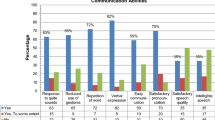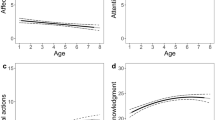Abstract
Purpose
The objective of this study is to compare social competence skills in children with CI and their normal hearing peers.
Methods
Forty-six children with normal hearing and 46 children with CI between the ages of 42 and 72 months were included in the control group and study group, respectively. Preschool teachers rated children’s social competence in the classroom using the Social Competence and Behavior Evaluation—Preschool Edition. Three subscales constitute the structure of the SCBE-30 scale: anger-aggression, social competence, and anxiety-withdrawal.
Results
The analyses showed that there were statistically significant differences between social competence scores of the study group and the control group. However, there was no statistically significant difference between anger-aggression scores and anxiety-withdrawal scores of the study group and the control group. There was a significant correlation found between anger-aggression score and the age of starting rehabilitation.
Conclusion
Anger-aggression scores and anxiety-withdrawal scores were similar between children using cochlear implant and normal hearing peers, whereas children with CI show lower social competence abilities than normal hearing peers. Earlier beginning to the rehabilitation programs coincide with lower anger-aggression scores. To the best of our knowledge, this is the first study to reflect these findings more objectively, from the view of teachers.


Similar content being viewed by others
References
Batten G, Oakes PM, Alexander T (2014) Factors associated with social interactions between deaf children and their hearing peers: a systematic literature review. J Deaf Stud Deaf Educ 19(3):285–302
Keilmann A, Limberger A, Mann WJ (2007) Psychological and physical well-being in hearing-impaired children. Int J Pediatr Otorhinolaryngol 71(11):1747–1752
Migirov L, Borisovsky G, Carmel E, Wolf M, Kronenberg J (2010) Integration of cochlear-implanted children into the general Israeli community. Sat 13:20
Wauters LN, Knoors H (2007) Social integration of deaf children in inclusive settings. Journal of deaf studies and deaf education 13(1):21–36
Stinson MS, Whitmire K, Kluwin TN (1996) Self-perceptions of social relationships in hearing-impaired adolescents. J Educ Psychol 88(1):132
Martin D, Bat-Chava Y, Lalwani A, Waltzman SB (2011) Peer relationships of deaf children with cochlear implants: predictors of peer entry and peer interaction success. J Deaf Stud Deaf Educ 16(1):108–120
Nunes T, Pretzlik U, Olsson JJD (2001) Deaf children’s social relationships in mainstream schools. J Deaf Educ Int 3(3):123–136
Schorr EA, Roth FP, Fox NA (2009) Quality of life for children with cochlear implants: perceived benefits and problems and the perception of single words and emotional sounds. J Speech Lang Hear Res 52:141–152
Lenarz M, Sönmez H, Joseph G, Büchner A, Lenarz T (2012) Long-term performance of cochlear implants in postlingually deafened adults. Otolaryngol Head Neck Surg 147(1):112–118
Hajioff D (2016) Cochlear implantation: a review of current clinical practice. Br J Hosp Med 77(12):680–684
Kumar R, Warner-Czyz A, Silver CH, Loy B, Tobey E (2015) American parent perspectives on quality of life in pediatric cochlear implant recipients. Ear Hear 36(2):269–278
Carlson ML, Breen JT, Gifford RH, Driscoll CL, Neff BA, Beatty CW, Peterson AM, Olund AP (2010) Cochlear implantation in the octogenarian and nonagenarian. Otol Neurotol 31(8):1343–1349
Williamson RA, Pytynia K, Oghalai JS, Vrabec JT (2009) Auditory performance after cochlear implantation in late septuagenarians and octogenarians. Otol Neurotol 30(7):916
Hayes H, Geers AE, Treiman R, Moog JS (2009) Receptive vocabulary development in deaf children with cochlear implants: achievement in an intensive auditory-oral educational setting. Ear Hear 30(1):128–135
Geers AE, Moog JS, Biedenstein J, Brenner C, Hayes H (2009) Spoken language scores of children using cochlear implants compared to hearing age-mates at school entry. J Deaf Stud Deaf Educ 14(3):371–385
Niparko JK, Tobey EA, Thal DJ, Eisenberg LS, Wang N-Y, Quittner AL, Fink NE, Team CI (2010) Spoken language development in children following cochlear implantation. JAMA 303(15):1498–1506
Svirsky MA, Teoh S-W, Neuburger H (2004) Development of language and speech perception in congenitally, profoundly deaf children as a function of age at cochlear implantation. Audiol Neurotol 9(4):224–233
Aslan F, Yücel E (2019) Auditory reasoning skills of cochlear ımplant users. J İnt Adv Otol 15(1):70
Almeida RPD, Matas CG, Couto MIV, Carvalho ACMd Quality of life evaluation in children with cochlear implants. In: Codas, 2015. vol 1. SciELO Brasil, pp 29-36
Vidas S, Hassan R, Parnes L (1992) Real-life performance considerations of four pediatric multi-channel cochlear implant recipients. J Otolaryngol 21(6):387–393
Percy-Smith L, Cayé-Thomasen P, Gudman M, Jensen JH, Thomsen J (2008) Self-esteem and social well-being of children with cochlear implant compared to normal-hearing children. Int J Pediatr Otorhinolaryngol 72(7):1113–1120
Laugen NJ, Jacobsen KH, Rieffe C, Wichstrøm L (2017) Social skills in preschool children with unilateral and mild bilateral hearing loss. Deafness Educ Int 19(2):54–62
LaFreniere PJ, Dumas JE (1996) Social competence and behavior evaluation in children ages 3 to 6 years: the short form (SCBE-30). Psychol Assess 8(4):369
Çorapçı F, Aksan N, Arslan-Yalçın D, Yağmurlu B Okul Öncesı Dönemde Duygusal, Davranışsal Ve Sosyal Uyum Taraması: Sosyal Yetkinlik Ve Davranış Değerlendirme-30 Ölçeği
Kluwin TN, Stewart DA (2000) Cochlear implants for younger children: a preliminary description of the parental decision process and outcomes. Am Ann Deaf 145:26–32
Bat-Chava Y, Martin D, Kosciw JG (2005) Longitudinal improvements in communication and socialization of deaf children with cochlear implants and hearing aids: evidence from parental reports. J Child Psychol Psychiatry 46(12):1287–1296
Hoffman MF, Quittner AL, Cejas I (2015) Comparisons of social competence in young children with and without hearing loss: a dynamic systems framework. Journal of Deaf Studies and Deaf Education 20(2):115–124
Brophy-Herb HE, Lee RE, Nievar MA, Stollak G (2007) Preschoolers’ social competence: relations to family characteristics, teacher behaviors and classroom climate. J Appl Dev Psychol 28(2):134–148
Garner PW, Jones DC, Miner JL (1994) Social competence among low-income preschoolers: emotion socialization practices and social cognitive correlates. Child Dev 65(2):622–637
Garner PW, Mahatmya D (2015) Affective social competence and teacher–child relationship quality: race/ethnicity and family income level as moderators. Soc Dev 24(3):678–697
Michael R, Attias J, Raveh E (2018) Cochlear Implantation and Social-Emotional Functioning of Children with Hearing Loss. J Deaf Stud Deaf Educ 24(1):25–31
Incesulu A, Vural M, Erkam U (2003) Children with cochlear implants: parental perspective. Otol Neurotol 24(4):605–611
Buhs ES, Ladd GW, Herald SL (2006) Peer exclusion and victimization: processes that mediate the relation between peer group rejection and children’s classroom engagement and achievement? J Educ Psychol 98(1):1
Huber M, Kipman U (2011) The mental health of deaf adolescents with cochlear implants compared to their hearing peers. Int J Audiol 50(3):146–154
Punch R, Hyde M (2011) Social participation of children and adolescents with cochlear implants: a qualitative analysis of parent, teacher, and child interviews. J Deaf Stud Deaf Educ 16(4):474–493
Hoffman MF, Quittner AL, Cejas I (2014) Comparisons of social competence in young children with and without hearing loss: a dynamic systems framework. J Deaf Stud Deaf Educ 20(2):115–124
Acknowledgements
We would like to thank to all teachers for their outstanding cooperation during the current study. We also thank Corapci et al. for allowing us to use the Turkish version of the Corapci SCBE scale.
Author information
Authors and Affiliations
Corresponding author
Ethics declarations
Conflict of interest
The authors report no conflicts of interest.
Additional information
Publisher's Note
Springer Nature remains neutral with regard to jurisdictional claims in published maps and institutional affiliations.
Rights and permissions
About this article
Cite this article
Topcu, O., Senli, F.D., Batuk, M.O. et al. Social competence in children with cochlear implants: is it possible to catch up with their peers?. Eur Arch Otorhinolaryngol 278, 2775–2780 (2021). https://doi.org/10.1007/s00405-020-06363-3
Received:
Accepted:
Published:
Issue Date:
DOI: https://doi.org/10.1007/s00405-020-06363-3




